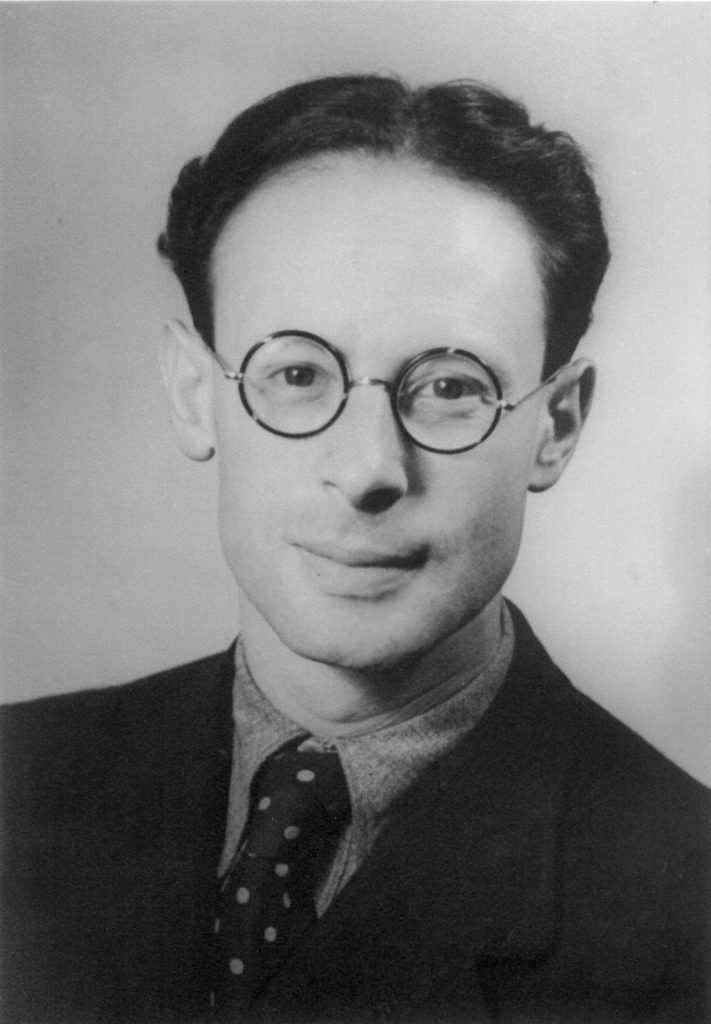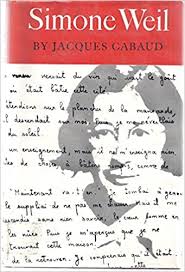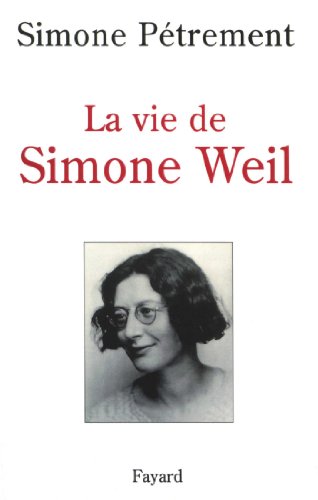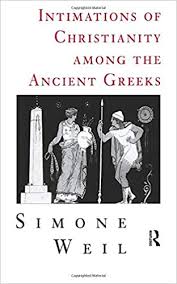A Q&A Interview with Eric Springsted
Ronald KL Collins & Eric SpringstedThis year Dr. Eric Springsted published his latest book: Simone Weil: Simone Weil for the Twenty-First Century (2021). He published his first book on Weil in 1983: Christus Mediator: Platonic Mediation in the Thought of Simone Weil.
This year also marks the 40th anniversary of the American Weil Society, which Springsted co-founded and for which he served as president for 33 years. In the arc of Springsted’s long career he has played a major role in both the organizational and scholarly development of Weil’s thought, including his own significant contributions as an author, editor, translator, and compiler. For those reasons, I asked two of Eric’s longtime friends (also Weil Scholars) to say a few words in his honor:
E. Jane Doering: “Eric, you’ve been the steady foot of the compass since the beginning of the American Weil Society, and we all express our infinite appreciation. Your prescience in maintaining over the years a community of Weil scholars who share research and reflection on this extraordinary French philosopher has nurtured a rich understanding of her religious philosophy throughout the world. We who have been intimately engaged in expanding a true understanding of Simone Weil’s inspired perception of the teleological purpose of every human being say, “thank you, Eric, for your diligence and patience in maintaining the American Weil Society throughout four decades.”
Lawrence Schmidt: “Eric, you were there at the start as one of the founders of the American Weil Society. Those efforts contributed immensely to the Society. But it was you, Eric, who organized things and kept the Society together as president from 1980 to 2014. Somehow, you assembled the list of members, sent out the announcements, cajoled members into hosting colloquies, and you kept papers on file long before computers or e-mail made it easy. For more than three decades you developed and maintained a fine relationship with the French Association. In the process, you kept everything relatively simple as the rest of us watched the American group grow.
Thanks to your efforts, the Society provided many of its members the only real academic home that they ever had. Early on, the group was small enough and diversified enough to give scope to their reflections on Simone Weil’s thought. Thanks in important part to your intelligent oversight, Eric, the American Weil Society provided the type of critical support that many members never found anywhere else in the academic world. So thank you, Eric. We are all in your debt, and happily so!”
Some of the questions set out below concern points Eric specifically addressed in Simone Weil: Simone Weil for the Twenty-First Century (2021) {ES, 2021}. In that regard, the reader is advised to consult his book for a fuller and more illuminating discussion of such points.
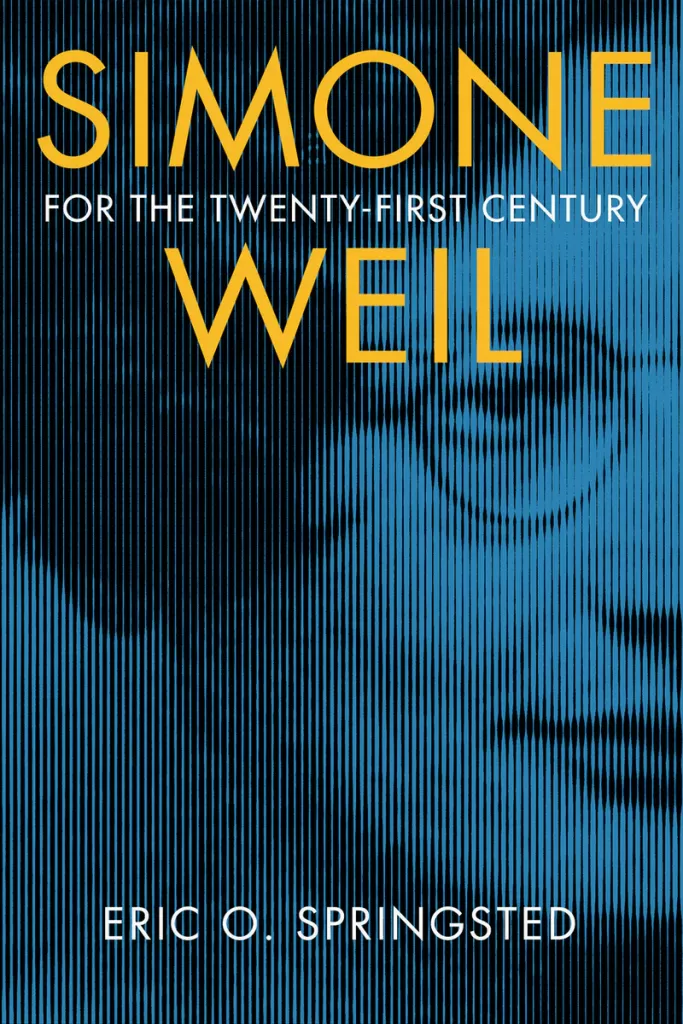
Collins: First of all, Eric, congratulations on your latest book and congratulations to you on the occasion of the 40th anniversary of the American Weil Society (AWS). Please share with us a little bit of how the AWS came into being and what it was like in its formative years.
Springsted: There was enough drama to make it worth telling. In 1979, the American Academy of Religion held its annual meeting in New York. Among the offerings that year was a group consultation on Simone Weil. I was writing my dissertation on Weil, and so Diogenes Allen and I went up to the meeting from Princeton. The consultation was awful, a real hatchet job. The convenors wanted to get a publication out of it. During the presentations, both Dick and I objected vociferously to what were egregious errors of fact and interpretation. We weren’t the only ones. Finally, the moderator asked us to take it into the hall. We were kicked out! Which I suppose is a very Weilian thing to happen to you. We went, and so did some of those others. They included Clare Fischer and Roy Finch, who also deserve credit for what came to be the American Weil Society. It was really the first time any of us had been together with others who were working on Weil. As we talked, we wondered how we might make something of it. There was a French Association but their meeting wasn’t going to be much help for us. And so, we decided to try to put together a group in North America. I finished my dissertation, and thanks to help from Allen, and a list of people who Clare thought might be interested, I wrote to a lot of people about starting an American Society. The first meeting was in Princeton in 1981. We have been meeting ever since.
Colloquy I
May 8-9, 1981
Princeton Theological Seminary, Princeton, NJ
- Diogenes Allen, Princeton Theological Seminary, “A Christian Theology of Other Faiths.”
- H.L. Finch, Hunter College, CUNY, “The Universalism of Simone Weil.”
- Betty McLane, University of Illinois, “Simone Weil’s Early Views on Perception.”
- Jane Pratt, Marquette University, “Simone Weil on Liberty.”
- Eric O. Springsted, Princeton Theological Seminary, “The Metaphysics of Transcendence.”
Collins: So much of your life – personal, educational, political, philosophical, and spiritual – has been devoted to Simone Weil. Why? When and how did your Weil journey begin and why has it continued so long?
Springsted: It started in 1975. I was studying at Princeton Seminary and took a couple of classes with Diogenes Allen. I was actually interested in Plato. He had been working on Iris Murdoch but was starting to read Weil since Murdoch said she owed so much to her. He suggested that I read Weil since she had so much interesting to say about Plato. I didn’t give up on Plato, but I have been reading Weil ever since. Why has it continued? She simply has been a formative influence. She opened up so much for me that I had some suspicions about, but that she articulated so well. I also read her at the right time. I think it is important for any of us to have a thinker who we can use as a touchstone, and she became that. But it has also continued, I am sure, because of the American Weil Society. Each year was an opportunity to write a paper, and as we went along it became an important group of colleagues. And, it has to be said, Weil is a rare thinker in that in her depth we have not run out of things to say and work on over all these years.
Collins: You attended St. John’s college in New Mexico, a small college known for its “great books” form of education – a type of learning, perhaps, most similar to Weil’s vision of learning as set out in her 1942 essay on school studies. How did your education at St. John’s influence the arc of your life?

Springsted: I can’t think of a better preparation for reading Weil. In good part it was a matter of having read the same books as she did. And I think there was a spirit in which we read them that was close to the way she read books. She took them seriously and lived them. Who else in the Twentieth Century thought that Plato was relevant, or Greek mathematics? We at St. John’s thought so; she brought that belief to the proof. In that respect, she completed the excitement and shaped the concerns that were born, but hardly mature, when I was at St. John’s. I might note that since I graduated, a long time ago, that Weil is now often read in tutorials at St. John’s. The school studies essay is one that is taken particularly seriously, and one that students there respond to very well. [See, e.g., Eric Springsted, “Simone Weil on having an inner life,” St. John’s, Graduate Institute Summer Lecture Series (July 2, 2019) – rklc]
Collins: Correct me if I’m wide of the mark, but much of your life has been devoted to finding a bridge between philosophy and theology with Simone Weil as a sort of intermediary between the two. Well?
Springsted: We have been talking about my interest in Weil and work on her. But I actually have an academic field, which is philosophical theology, and my big concerns are with questions of faith and reason, and all the questions that arise when those two fields face each other. I wrote a book on the nature of faith. It wasn’t a Weil book, but she certainly showed up. One area where I think that she is extremely important is how one might conceive accurately the relation of intellect and faith. A lot of contemporary thinking about that relation has tried to force the thinking that is natural to faith into an inappropriately rationalistic mold. It treats faith as if it were just a matter of belief, and not a conceptual thinking that is rooted in a way of life. She understood that profoundly, and if she is taken seriously there is a lot that she can contribute to those questions. I hope that this most recent book has brought some of that out.
Old Friends
These essays owe a great deal to many colleagues over the years.
{ES, 2021, p. xv}
Collins: Before I turn to other topics, including your latest book, I want to ask you about some old friends, about people who played a role in your life as well as the life of ideas surrounding Simone Weil.
You were close with Diogenes Allen (1932-2013) and even did a book with him — Spirit, Nature and Community: Issues in the Thought of Simone Weil (1994). Moreover, I assume, you had a hand in the republication of his book Three Outsiders: Pascal, Kierkegaard and Weil (2020). Tell us a little about “Dick” and his contributions to Weil scholarship.
Springsted: We actually did three books together. He had written a book, Philosophy for Understanding Theology, which was to introduce theology students to the philosophy they needed to know to understand theological thinkers old and new. We co-edited a reader to go along with that, and then I wrote a number of chapters about contemporary philosophy for a second edition of the book. I also edited a festschrift for him.
Dick was a very important part of Weil scholarship in the 1980s and ‘90s. He took seriously her thinking about suffering, and this showed up in a number of his writings. His contribution to Richard Bell’s book, which we are about to talk about, on Weil’s notion of reading was masterful. His later work on spirituality owed a lot to her. What he did was not just intuitive but the result of a lot of hard thinking until he had it right. As a thinker, writer and teacher he had an exceptional ability to make difficult thought clear. This was seen in his classes at Princeton Theological Seminary, but it was also a great help in discussions in the Weil Society, although he didn’t suffer fools gladly.
Collins: You knew Richard H. Bell (1938-2016) and contributed an essay to one of the books he edited, Simone Weil’s Philosophy of Culture (1993). You were also at the conference Richard organized at Cambridge University, which included the likes of Rowan Williams, Andre Dévaux, and D.Z. Phillips (1934-2006), among others. What can you tell us about Richard as you knew him?
Springsted: Richard joined the AWS in the late 1980s, and quickly became active. This was especially owing to a large grant he got about 1990 from the NEH, which resulted in the Cambridge conference, and a follow up at the College of Wooster where he taught. It all meeting resulted in the book you mentioned. This effort was one of the high points of anglophone Weil scholarship. In addition to the folks you mention, Peter Winch was also at the conference, as well as Jean-Yves LaCoste, Miklós Vető, and Patrick Sherry and all the folk mentioned above, among others.
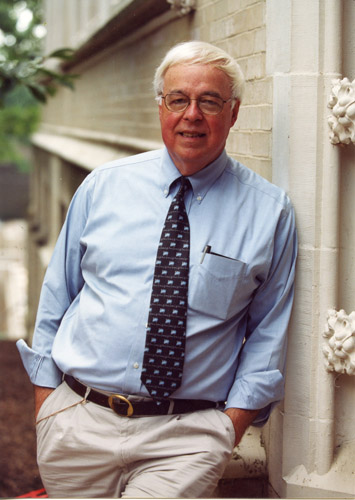
Richard was a great organizer, had ambitions of his own, and valued cooperative work that he always pulled off. He was a wonderful colleague, and being a good colleague is something to be, which few people see as a virtue. He also had wide ranging interests and got a couple of Fulbrights that took him to Africa which drew him into African philosophy.
Collins: Martin Andic. You knew him, well. In the world of Weil scholars, few can rival Martin’s scholarship – oh, how he loved footnotes! He wrote thoughtful articles for a variety of publications, including Cahiers Simone Weil. Tell us about Martin. And can you recommend any particular work of his for our readers?
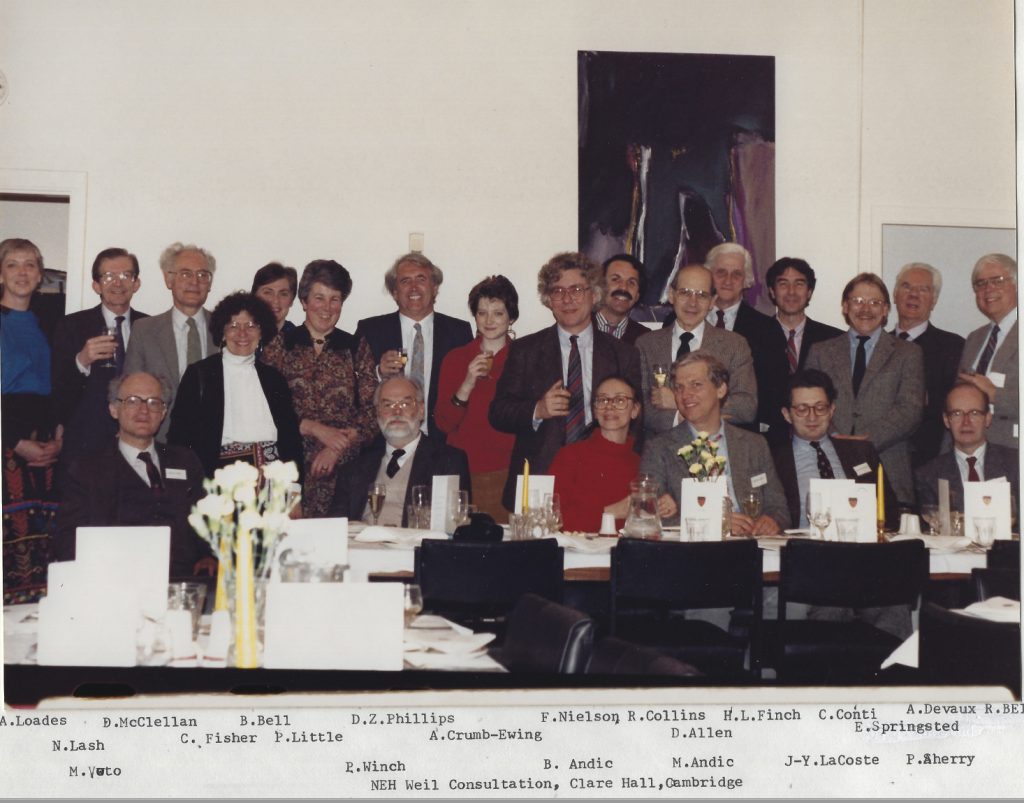
Springsted: Martin joined the Society in 1984 and he gave a paper every year until his too early death in 2004. He had a fascinating, wide ranging mind. Many of his papers were comparisons of Weil with some literary figure. They would often start something like this: “Weil never read Emily Dickinson, but had she, she would have liked her.” He managed to pull it off.
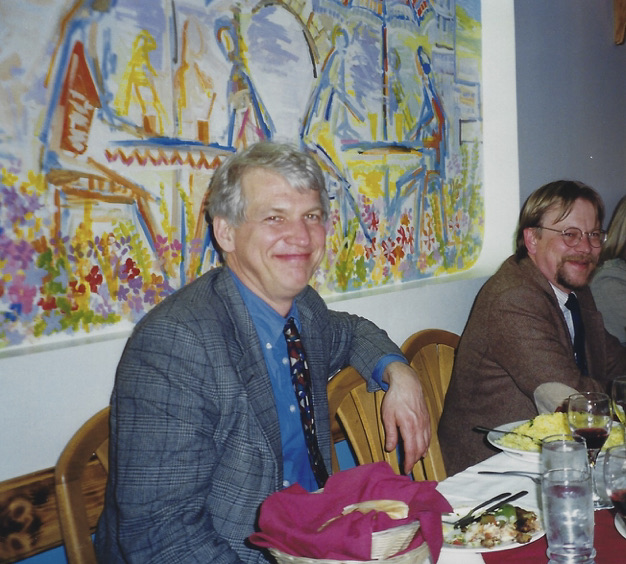
He had collected a number of his essays into a book which was to come out in the SUNY Press Weil Series, but for some reason he never put the finishing touches on it, and it was therefore never published. His works can be found in Cahiers Simone Weil and in the Bell volume, as well as in The Christian Platonism of Simone Weil, and The Beauty that Saves, which John Dunaway and I edited. That contribution on Shakespeare’s Fools was particularly memorable.
Collins: Speaking of Martin Andic, he edited Henry L. Finch’s Simone Weil and the Intellect of Grace (2001). What was Henry like and what, in your opinion, was his keenest Weil insight?
Springsted: Roy was one of a kind. His knowledge was wide-ranging and often esoteric. He often equated Weil with a prophet or sometimes a shaman. You had to listen carefully when he said these things, because they were wild, but if you let him expound a bit, they made sense and gave a whole new perspective on things. He, too, contributed a paper at every AWS colloquy from the first one to his death. Martin, whose own mind complemented Roy’s very well, edited these, and after excising some of the wildest claims, this was a really good book. Roy was particularly passionate about Weil’s universalism, and he was adamant in distinguishing grace from power, and eschewing pretty much all relations built on power, such as nationalisms. That reflected his own pacifism. I learned a story about him later from my father-in-law who was a classmate of Roy at Yale before World War II. It seems that at some point Roy planned to jump off the Empire State Building to protest getting into the war. Fortunately, he was dissuaded when it was pointed out to him that somebody on the sidewalk could get hurt.
Collins: You once dined with André Weil and his wife Éveline. What was he like? And in what respects was he like and unlike his sister?
André Weil / © Sylvie Weil
Springsted: The occasion was a big afternoon and evening conference or, better put, program, put together at Princeton University. André was there as was Susan Sontag, who owes me about half a pack of cigarettes since she hadn’t brought her own even though she was a chain smoker. Dick Allen and I were fortunate in being able to eat with André and Éveline.
Andre was a truly charming person, even if he had a ferocious reputation. I don’t think he ever truly got what his sister was about; it wasn’t how he thought at all. But he was truly devoted to her and wanted to see her taken seriously. This was the same sort of concern and respect that she had for him during her life. Very different minds, but a common respect for intellect, and both had a wicked sense of humor. During that time, I also used to run into him frequently at chamber concerts at Princeton, or even buying the New York Times on Sunday at the newspaper kiosk in Palmer Square.
On Philosophy
Weil’s philosophical and religious and social thinking are all of one piece.
{ES, 2021, p. 229}
Collins: In his book Attention to the Real (2012), Robert Chenavier wrote: “For Simone Weil the beginning of philosophy is an awakening to the real.” What does that mean to you as you understand Weil?
Springsted: There is a sense of “realistic” in which the one who is being realistic supposedly knows how things really go, or at least claims to. I don’t think Robert meant that, and he is quite right about Weil in that regard. She didn’t mean that, either. Weil had a certain similarity to John Calvin: she had a true dread of idolatry, and we are offered so many idolatries. So there is always a sort of reforming, negative, effort in clearing away and resisting anything less than reality and always waiting for more to be revealed. Thus she did not believe in philosophical systems, such as Hegel’s. That is not intellectual nihilism. There are things we stand on, but we have to realize how incomplete our understanding of them can be. So “awakening to the real” is a matter of realizing both the worth of what we stand on, and its veiledness; it is looking for more, and not encasing what we have.
Collins: In 1989 Peter Winch (1926-1997) published a very different kind of book on Weil and her thought: Simone Weil: “The Just Balance.” You have characterized it as “the best philosophical work on Weil in English . . . .” {ES, 2021, p. 35}. Why do you say that?
Springsted: First of all, there aren’t that many works that are thoroughly philosophical in English on Weil. Winch’s work is truly a philosophical examination. But it also isn’t the last word, and Peter never said that it was. He states his limitations at the outset. But he raises truly philosophical questions, and is able to conceptualize Weil’s work in a profound way. Or, better put, he is able to grasp at some depth the way that Weil conceptualized the world, and how the way she did is the work of a first rate philosopher. Most books don’t come close to that.
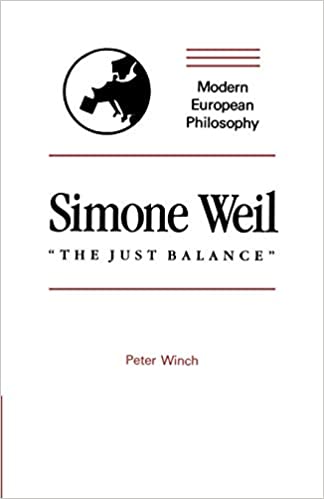
Collins: In 1985 you published an essay in Religion and Literature entitled “Contradiction, Mystery, and the Use of Words in Simone Weil.” In it you wrote: “she saw mystery as essential to religion.” How so?
Springsted: She wasn’t very different than Gabriel Marcel who distinguished between a “problem” or a “puzzle” whose tensions and oppositions, at least in principle, can be solved, and a mystery which is something very different. Mysteries are not harder puzzles; they are not meant to be solved but to be listened to and gazed upon; they invite us in. Certainly the way she saw it, they enlightened the intellect, they didn’t defeat it. That is very Augustinian as well. We live in a time when answers are reductionistic. Too often even religion is reduced to a problem by any number of people, and that includes theologians. Charles Taylor has called the world “flattened.” A world without mystery is flattened.
Collins: The “central claim” of your latest book, you stress, is “that there is a subtle but crucial orientation in Weil’s thought that distinguishes her sharply from many other thinkers.” {ES, 2021, p. x)} In short, what is that orientation and why is it significant?
Springsted: It is that with regard to what is most important in human life, the mysteries that cannot be spelled out in good logical form, that love is the way to approach them, not the intellect. In this regard, while she certainly valued intellect and had an intellectual vocation, the intellect was not the highest faculty, love is. This is something that she shares with Augustine. Recognizing this, and figuring out what it means gives a very different perspective on her thought.
Collins: You have defined work, as Weil understood it, as a “willing obedience to the universe.” (ES, 2021, p. 204). As Weil developed it, her notion of the value of work had links to so much in her sociological, political, and spiritual thought. Can you elaborate on that and the importance Weil attached to work?
Springsted: One thing that held her interest from her earliest writings to the last words she wrote was work. She was interested in how it was done, what the conditions were of workers, how to make it work for workers. What it stands for encompasses what it means to have a body subject to necessity and to be subject to time. That is a lot and it is where those links exist. Work, which she thought would always be with us, is obedience to the universe. It needed to be conceived in such a way for her that that obedience was willing, and that it opened one up in the end to the beauty of the universe. The sort of work that is oppressive therefore needs to be reformed. Work also needs to be understood in its broader context, not just as a way of surviving.
Collins: Sometime in 1938 Weil read T.E. Lawrence’s Seven Pillars of Wisdom (1926), to which H.L. Finch devoted a chapter in his book Simone Weil and the Intellect of Grace (1999), pp. 51-58. As you know, in a letter to David Garrett, who edited Lawrence’s Letters (1938), Weil wrote with great admiration of the man and his book. What was it in Seven Pillars of Wisdom that so inspired Weil? And why is that important?
Springsted: Roy’s essay does a better job than I can in spelling this out. He puts his finger on two things: Lawrence’s attempt to keep killing at a minimum, and his ability to see all people as equals even in the midst of war. The Iliad essay seems to have benefitted from her thinking about this. It seems that Lawrence is for her a contemporary analogue to what she sees in Homer, who feels pity for all, and who is able to see clearly the destruction, especially of the inner person, when one is touched by violence. Interestingly, Lawrence’s “keeping the killing at a minimum” was largely due to the fact that the Arab forces that he led, who were tribesmen and not regular soldiers, had no taste for casualties. Thus, he was forced to think about how else to fight other than head on combat. The result was largely guerilla warfare.
Collins: In late March of 1938 Weil had a mystical experience at the Benedictine Abbey of Solesmes. In your chapter on “Mystery and Philosophy” you reference that experience as a way of doing philosophy “by attention” as contrasted with “strict intellectual discipline.” You ask: “[H]ow does one think in the face of a mystery?” {ES, 2021, p. 17}
In light of that, how might Weil’s manner of thinking be defined (or explained) before her 1938 mystical “conversion”? Was her method of thinking different in what she wrote in, say, “Let is not Have Another Trojan War” (1937) from what she wrote in her 1942 essay “Reflections on the Right Use of School Studies with a View to the Love of God”?
Springsted: That essay (in English “The Power of Words) doesn’t leap to mind as the prime example to contrast her earlier thinking with her later. That is an insightful essay, warning us not to believe in ghostly abstractions, and it is one that also reflects her pacifism at the time. A lot of what she says then she could have said later. But I think, upon reflection, that you have a good point here in pointing to this essay. She does seem to think that once we have cleared our mind of these meaningless words that drive us to violence, that we can deal with the “data.” She seems to be pointing to a solution that would be constructed rather rationalistically. I don’t think she would have said “data” are the issue in her later, more contemplative approaches.
On Christianity and Baptism
The story is told that she was baptized in her last days by a friend.
{ES, 2021, p. xxi}
Collins: Unsurprisingly, the word “Christianity” is often used in connection with Weil’s thought. Works such as Intimations of Christianity among the Ancient Greeks, however, and your latest book {ES, 2021, pp. 68-85}, along with your book with Jane Doering (The Christian Platonism of Simone Weil (2004)), suggest that the word, as Weil understood it, may be in need of some unpacking.
And then there is her brother André’s quip: “I think her view seems to have been that all religions were essentially one and the same.”{The Apprenticeship of a Mathematician (1992), p. 155}.
What is your sense of this? – just how Christian was Weil’s Christianity (leaving aside her “Catholicism”)?
Springsted: Of course, it depends on what you are going to accept as Christianity. She seemed to have assumed that in order to be Roman Catholic you have to accept everything that the magisterium says. So she kept asking priests, as she did in Letter to a Priest, if one can be baptized if they believed X, and then she trotted out a whole bunch of really questionable Xs.
This can be typical of converts and would-be converts; they tend to take things more seriously than birth members of a religion who tend to pick and choose what is really important. It probably also had to do with dealing with Dominicans like Joseph-Marie Perrin, too, although he was certainly an open man, and she seemed to have taught him some things. That’s context.
In the end, though, she needs Jesus, the incarnate God, and what she says, and the analogies she draws, don’t make any sense unless you have a God who has left the heavens and subjected himself to necessity, all the way to an afflicted death on a cross. That is the model and standard by which she judges participation (a good Platonic term) in God’s love. She sees this working also in other religions, even though they may well have a perspective on it that Christianity doesn’t and that it could learn from. Religions that depend simply on election, power, group-think, or that like the Docetics deny the physicality of suffering necessity, she sees as idolatries. So she is certainly Christian on this score. And that she is, I think, is demonstrated insofar as Christians read her and learn something about their religion.
I think André’s comment confuses her universalism – God’s grace is everywhere – with a very different issue: religions aren’t really different. Wittgenstein said “All religions are wonderful!” I think she would have agreed. It doesn’t mean they are the same, any more than all painters in 16th century Florence are the same, even if they are all wonderful.
Collins: On a related matter – as early as 1989, you’ve wrestled with the question of the relation of Christianity to culture, a topic you addressed in your article titled “The Religious Basis of Culture: T.S. Elliot and Simone Weil,” Religious Studies, (1989) vol. 25, pp. 105-116. In that same article, you wrote of “the religious values inherent in a culture” (p. 113) and thus seemed to be speaking more generally concerning religious values not confined to Christianity. Mindful of such concerns, how does all this play out in pluralist religious cultures?
Springsted: In her essay “A War of Religions,” she argues that every culture answers in some way to how it is related to the ultimate, even if it is a negative answer. Eliot argues something similar, and then launches into whether England could be called Christian after Chamberlain’s capitulation to Hitler. By the way, Paul Tillich also argued something similar. They were perfectly aware of differences; they were interested in what ultimately holds all the differences together. Perhaps nothing; that is what paganism is, or, perhaps, when the answer is “nothing” that it is just power that holds it together. The Romans built a temple for every religion in the Empire that they had conquered. They were great pluralists, and one could believe what one wanted – as long as one bowed a knee to Roman power.
Collins: There is, as you know, some controversy over Weil and the baptism question and whether she was baptized on her death bed – and you’ve written about that. Quite apart from the factual controversy, does it matter, and if so, why?
Springsted: I wrote about this because one day in the mid-1980s, quite out of the blue, I got a phone call from Simone Deitz. She was the one who performed the baptism; she was not identified in Pétrement’s account because she didn’t want to be. I met with her, and in writing her story I hoped to get as many details out as possible. (She also gave a talk to the AWS in 1987, which we recorded.)
One of the things I learned in the course of this was not what it meant to Weil – there is no way to tell that, but what it meant to a whole lot of other people. Good Catholics, for whom the act of baptism is a sine qua non for salvation, and who saw Weil as on their side thought this story was a clincher. For a lot of French who are secular and anti-clerical, but whose understanding of Christianity is confined to Roman Catholicism (there is only one true church that you can turn your back on) saw it as forced on her. Hence she could remain one of them.
The irony in all of this is that I am an ordained Presbyterian minister, and while we certainly believe that baptism is normative for the Christian life (e.g., partaking of the Eucharist) salvation is up to God, and God can make exceptions if God wants to. No limbo for us. So, I did not have quite the same stake in it as others did and was probably naïve about what others were really worried about. My considered view is that it happened. We cannot say what Weil thought about it. We also cannot say that her views about the institutional church changed as a result. The rest is up to God as far as I am concerned.
Rootedness & Uprootedness
We are starved spiritually when we lose roots, we lose Being, we lose the ability to think deeply about moral and spiritual things.
{ES, 2021, p.165}
Collins: In reading your book {ES,2012, pp. 166-167}, I sensed a tension between Weil’s “Reflections Concerning the Causes of Liberty and Social Oppression” 1934 essay and the report she prepared in 1943 for the Free French that came to be known as The Need for Roots. The former – and correct me if I am mistaken – seems more individual focused whereas the latter seems more social focused. What is your sense of this?
Springsted: It is not only those two writings. I think that is a characteristic distinction between her early and late writings. Her diploma essay, “Science et Perception dans Descartes,” has a solitary mind constructing thought of the world alone out of sense perception. It has a broad context, but certainly no sense of how our knowledge is so much a part of our social interactions. That changes in her later writings, especially as she lays importance on paying attention; attention is not constructing knowledge, it is being revealed to.
Collins: On a related front: Weil devoted a lot of ink to highlighting the evils of collectives and of collective “thinking.” Yet in The Need for Roots that concern seems to take a back seat to her more communitarian focus and the importance of small communities. What explains this?
Springsted: Certainly France’s defeat and her leaving France in 1942 both played a big role in a newly acknowledged value of her patria. She was also learning at the same time the value of cities and institutions as metaxu, intermediaries. Her unfinished play, Venice Saved, certainly comes from this recognition. So she spent a lot of time thinking about when it needed to be thought about. We could learn something here.
Collins: We live in the era of the big nation-state, a state defined largely by national loyalty, runaway materialism, military conquest and colonialism (past or present), an ideologically rigid two-political party system, and an ever-greater influx of immigrants. In light of that, how does any project of rootedness even begin?
Springsted: All of those are factors that push us towards uprootedness, and are symptoms of it. Where we can begin re-rooting ourselves is by a new appreciation of whatever roots we might have left. You can’t really invent them; it’s not a technical problem. In America this is the big question – what do we have left? What common story is there that binds us in a way that we can draw nourishment from our communities, our environment, and that lets us be sustained the heavens above? Despite the American reputation for being rootless, I think we had such stories. We also have factors that have undone them and led us to where we are.
Collins: In your book you speak of “historical situatedness” in connection with rootedness {ES, 2021, p. 161}. In reading that, I thought of my mother who in the 1940s fled the brutal authoritarianism of Guatemala. For her, coming to America was a blessing despite the fact that her family remained in Guatemala. Today, more than a half-century later, much the same holds true for that country and others like it. My point: there comes a time in some people’s lives when remaining rooted (in an “historical situatedness” sense) is impossible. My question: if so, can one, as it were, re-root?
Springsted: In the case of war and violence you have some of the greatest causes of uprooting. When there is nothing left, there is nothing left, and you are far better off leaving. One can re-root in a new place, but it isn’t easy. Language, customs, etc. are all foreign and it is not easy to draw sustenance from them. You barely understand them. If there is a healthy situation in the environment where you end up, you can start to draw sustenance from it, though. But as we know by the normal experience of American immigration this is often a matter of generations. At least the first two almost always feel tensions, even though they are grateful and usually are the ones most dedicated to becoming part of the new country. But they always feel a bit torn, too.
Collins: Another threat to rootedness, is technology. Just think how the technologies of travel by plane, train, and car have affected people and their movement. Or consider how interstate highways carved through thriving minority communities prompted many to uproot and relocate. Or think of our own lives and how few of us have remained in the town or state in which we grew up. By that measure, are we and our children destined to remain uprooted?
Springsted: Just because we move around a lot doesn’t mean we are uprooted, although it can. Roots can be things that keep you fixed in one place, but Weil didn’t tend to use the metaphor this way. She primarily thought of roots as the means by which we drew sustenance from our environment. So moving around isn’t always a problem. However, technology in the broader sense certainly can be. It can be distracting, it can cause us to fail to develop deep personal relations, it can cause us to think we are nothing but the images we put up on social media. It encourages shallowness, and an easy way out. There is no “work as a spiritual operation” in a technological world. The MIT psychologist Sherry Turkle has done a wonderful job in researching this and writing it up.
Marching into Modernity
[H]er late political and social writings are striking because there are not meant as an approval on our current discussions. They are meant to make us look at our social being in a very different way and to find entirely different kinds of solutions … to our current malaise.
{ES, 2021, p.229}
Collins: In his 1964 biography Simone Weil: A Fellowship in Love (p. 258), Jacques Cabaud wrote that “many readers” believe that “Simone Weil . . . does not belong to this century, that she is a figure out of the Middle Ages astray in the modern world.” In light of your latest book, what is your reply to that?
Springsted: Cabaud reports that statement with respect to her love of antiquity and even her ascetic practices. At the time he did so, the 1960s, people of that time saw themselves as being of a whole new age. Catholics who were used to neo-Thomism couldn’t shed it fast enough. Dietrich Bonhoeffer talked about a world come of age. A lot of people have learned to discard that sort of age-prejudice and arrogance. Thinking you have come of age is actually an adolescent fixation. Intellectually speaking, there is now a new appreciation of the Medieval period. We can’t go back but we can learn from a different age. I think that Weil’s offerings to our time owe a lot to never having developed the foolish prejudice that our age is novel and gifted and special. She learned a lot from our traditions, and yet she never thought we could just go back.
Collins: On a related point, how do you respond to charges like the one leveled in 1977 against Weil by the likes of Connor Cruise O’Brien that she was hopelessly utopian? — a matter you address in your latest book {ES, 2021, pp. 165-168, 204}. Would you share with us a kernel of your thinking in this regard?
Springsted: Well, that is a comment from one who claims the authority of being “realistic.” Politicians are good at figuring out how to move from here to there, but that assumes a status quo, an accepted framework for thinking about how one can move. With no French government in 1943, there was no “here” for Weil so why not talk about just where we want to be without constraint? That is utopian in a sense, but one that is critical of the idols of the theater, and that is important. That is where her writing can awaken us to new possibilities, and that can shake us up thoroughly. As I argue, her last work was conceptual, not reformist. People like O’Brien don’t think that way. In fact, I can’t think of many politicians who could say anything genuinely insightful about Weil’s thinking. Maybe Lech Walesa or Vaclav Havel could have done it.
Collins: Weil was highly critical of modern science. As she saw it, modern science is more concerned with mastering nature than with being obedient to it. {ES, 2021, p. 202}. In that regard, what is problematic with scientists trying to conquer COVID 19, or scientists trying to master depression with anti-depressants, or environmental scientists venturing to solve any range of problems created by the mere existence of mass populations? Is the problem modern science itself or rather how science is used? In other words, is the problem a philosophical problem or one of application? {ES, 2021, p. 99}
Springsted: One should be careful of conflating the uses of science in technological production with scientific descriptions of the world. It is an easy conflation and the good things that technology produces (although often with unknown side effects) lends authority to the descriptions from which they proceed.
Weil didn’t actually say a lot directly about technology, but she was very concerned with how contemporary science described the world and how we as a result come to think of ourselves in the universe, and what thought about the world is like and what it means to do. In contemporary science she thought there is no easy way to think of ourselves in the universe, or of the universe as meaningful; there is no natural point d’appui for the human being. That is the point of the essay formerly known as “Classical Science and After” which I retranslated and retitled as “At the Price of an Infinite Error: The Scientific Image Ancient and Modern” in Simone Weil: Late Philosophical Writings. The title is awkward but accurately descriptive.
Collins: If Weil were alive today and living in the United States (which certainly would make her very anxious), what two or three things might concern her the most?
Springsted: In 1936 she noted that after the elections in France, that, although the forms had all been followed, nobody really believed in the republic anymore. That is a loss of legitimacy. We are concerned right now about the state of democracy. That makes it sound like it were a machine that isn’t functioning right. Our problem may be actually more like France’s in 1936.
We are pretty close to not believing in our governmental forms – and I write this at the very moment when a corrupt and psychologically damaged President is egging on right wing wannabe warriors who are storming the Capitol. That is a simple but profound problem: the loss of legitimacy. That comes from the lying, the corruption, the power grabs. It also comes the cynicism that results when any of those things are working for a political leader and as a result he or she won’t stand up against them. The other issue would be the environment. Even in 1943 she was concerned with what the West had done to destroy the beauty of the world and the damage that did to human souls.
On Writing & Writers
Borrowing a suggesting Plato makes in the Republic, [Weil] thinks one needs to think about contradiction because it is what ultimately will allow one to emerge from a point of view. It allows one to move from a limited perspective on reality to one that is far more inclusive.
{ES, 2021, p. 23}
Collins: You write that Weil “uses language in a highly paradoxical way, a rhetorical strategy needed to shake readers from running lethargically in worn and common conceptual ruts.” {ES, 2021, p. 184}. Tell us more about that “strategy.”
Springsted: It is not unusual historically. Mystics use such language. Jesus used it, Plato used it. And she isn’t the only one in our time. She just happens to be good at it when most others like the Deconstuctionists just sound like pretentious clowns.
Collins: Weil “gets caught up in clichés that she herself would be put off by in different circumstances.” {ES, 2021, p. viii} For example?
Springsted: Very simply, she did make some comments that are stereotypical and anti-Semitic. They are no more thoughtful in her mouth than they are in anybody else’s. These aren’t always the same ones as when she worries about the Old Testament or Israel’s sense of election, though.
Collins: In a 1941 essay, published posthumously in the Cahiers du Sud (no. 310, 1951), Weil wrote: “Writers do not have to be professors of morals, but they do have to express the human condition. And nothing concerns human life so essentially, for every man at every moment, as good and evil.”
Talk to us a bit about what you see as the responsibility of writers today. Does it even make sense to speak of responsibility given where we are in today’s times when facts don’t seem to matter, when science is ignored, and when propaganda all too regularly overwhelms truth? How does any writer escape, for example, the all-encompassing influence of social media?
Springsted: She thought if writers had any kind of authority in a culture, and they did (and do) in France, they have a responsibility. They can be inventive and creative; they should be. But they should reveal the world that is the real source of beauty and truth. That can be done in fiction, and there are writers like that. Their work is a gift. But there is also a matter of prestige and money and obviously a lot of writers start to think because of their success they are saying something important. As to social media, if that is a writer’s medium, I would audaciously suggest given the audience one is writing for, that such a writer has little chance of revealing the world.
Collins: Simone Pétrement’s biography of Weil is two volumes in the French edition, though its English counterpart consists of a sole volume. How much of a drawback is that for English readers? Relatedly, is there still a lot of Weil’s opus that has yet to be translated into English and, if so, how much of a problem is that?
Springsted: The biography is a big book. When it first came out, for personal use I went through it and noted where the condensations and deletions occurred. The loss is mainly to the scholar, probably. What we have in the English, even if abridged, is still more and better than any other biographical work in English.
There actually is not a lot, particularly important works, that is not now published in English. Over the years I have worked hard at making sure that what we do have in English stays in print, and is even increased. Three volumes – Selected Essays 1934-43; Seventy Letters, and First and Last Notebooks—that Richard Rhees translated in the 1960s are now back in print (Wipf and Stock). I took most of the essays from a fourth, Science, Necessity and the Love of God, and got them in Simone Weil Writings Selected (Orbis) and Late Philosophical Works (University of Notre Dame Press). That latter book also has a number of previously untranslated and unpublished essays. So, we are in pretty good shape, but it has been an effort to do it.
Collins: The NYRB imprint has a new translation by Tess Lewis of The Need for Roots in the works. Given that, should this future edition of TNFR include T.S. Elliot’s essay or should it be replaced? What do you think?
Springsted: If it doesn’t include Eliot’s essay it is because Eliot has been lost to the mind of the reading public. That is sort of an admission of our uprootedness.
Approaching Simone
To read as Weil thinks we should demands an apprenticeship …
{ES, 2021, p. 95}
Collins: What do you see as the biggest trap one should avoid in reading and thinking about Simone Weil?
Springsted: The belief you can keep your present frame of reference. She has a lot of radical things to say about justice, for example. Justice is love, is one of them. People get excited about that but then turn it into what they think are exciting and daring examples of – what? Almost always commonplaces of modern political liberalism that have nothing to do with love or self-sacrifice. The same holds true for her notion of attention. It gets turned into “noticing” which is a good idea and a step forward, but it isn’t what she was talking about and challenging us to do.
Collins: What books and/or essays do you suggest for first-time Weil readers and why? And what is your sense of beginning with Gravity and Grace?
Springsted: Waiting for God, I think, and if it is her spirituality that one is interested in then Simone Weil, Selected Essays: 1934-1943. For social thought, Oppression and Liberty and The Need for Roots. In a generation past, I would have said On Science, Necessity and the Love of God but that is out of print. As I noted earlier, many of those essays have been put elsewhere such as Writings Selected. The Simone Reader has a good selection but that, too, is out of print. I think it is always best to read her essays, which is the record of a mind thinking something out from beginning to end. For that reason Gravity and Grace has a lot of limitations. It is not a book that should be quoted in a scholarly essay. But its bons mots are striking. It maybe is best as a book that is on one’s bedside table to be picked up and read a bit at a time.
Collins: What is your recommendation of how (and when) to read Weil’s notebooks?
Springsted: I first read them as I was working on Weil, and put together an index for my own use. Having that allowed me to go into the notebooks where she is working through an idea that will often appear in a finished essay. You can see how her thought develops. But those notebooks also contain a lot of singular thoughts. I think one wouldn’t start reading them until he or she was already deeply involved in Weil’s thinking, but that is not a warning. I wonder what it would be like for a really attentive reader to start with them.
Collins: What advice would you give to a new generation of Weil scholars, both as to “dos and don’ts”?
Springsted: A lot of current scholarship in general does not deal very thoroughly or very well at all with texts: looking at the grammar, the style, the context, doing cross referencing, and above all following the argument and trying to understand the mind of the author. Few people think they themselves have to know the books that an author like Weil is working with and that is a mistake. You ought to know Plato.
Now, instead, there is a tendency, rather than working through a text, simply to alight on a single phrase, say from Gravity and Grace, and torture it to death. Such is the legacy of deconstructionism and contemporary literary theory. So do learn to work with texts. And if you can, make the effort to learn enough French so that you can read, even badly, the texts in French and be able to look up words.
Collins: In your opinion, what areas of Weil’s thought have been largely overlooked (at least in English) such that they are in need of examination and elaboration?
Springsted: Upon consideration, despite her work on the Greeks being mentioned regularly, I realize that I haven’t heard in a while any reference to those essays in Intimations of Christianity among the Ancient Greeks. They really are important and they are beautiful. Second, once the Berlin Wall went down, nobody ever thought about Communism again, and a lot of her work on Marx is now not read. It is important. Third, there is an interest in her spirituality but that doesn’t mean that it gets examined theologically.
Collins: Thank you, Eric, and thank you for all you’ve done, and continue to do, to illuminate the life and legacy of Simone Weil. Finally, and to paraphrase a line from Plato’s Republic: In this journey and in the journey of a thousand years, may you fare well* my friend.
* The Republic of Plato (620-d), A. Bloom. trans, (2016, ed.), p. 303.
Springsted: Thank you Ron, for this opportunity and the close and attentive reading you have done that allows these kind of questions.
56 Recommendations

